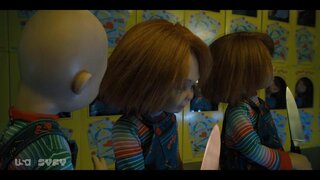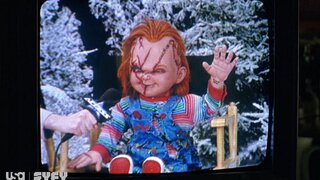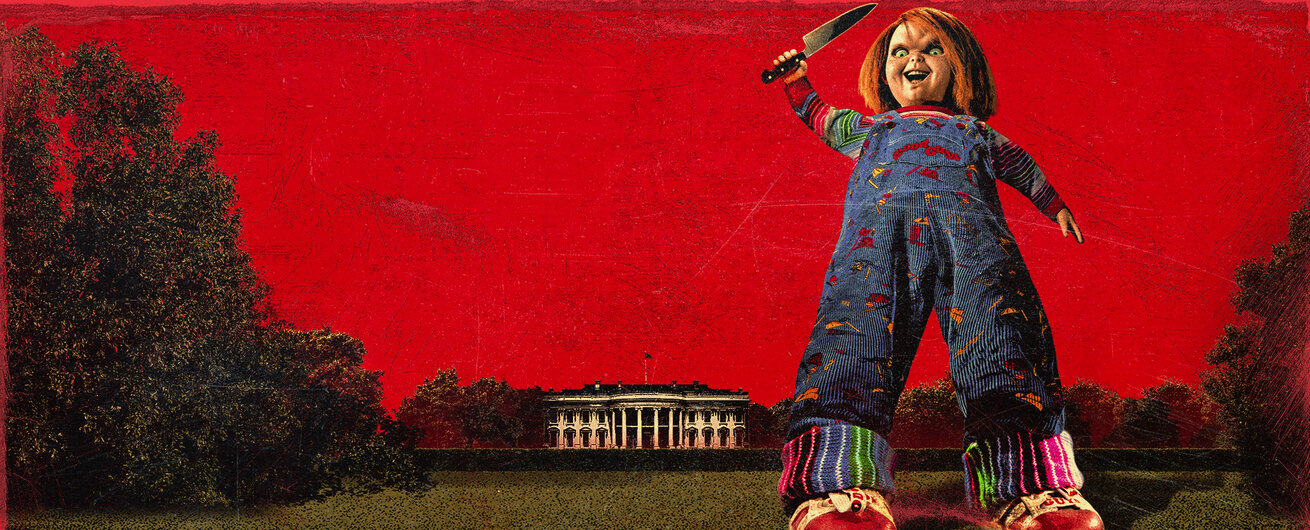Create a free profile to get unlimited access to exclusive show news, updates, and more!
What Is Pediophobia And Can 'Chucky' Cause It?
Whether it's "Chucky" or the "Child's Play" movies, the infamous murderous doll could be the cause of people's real-life phobia of dolls.
The premiere episode of “Chucky” Season 2 saw the kids deal with their very reasonable fear of dolls, clinically known as pediophobia.
Following their encounter with the possessed Good Guy doll carrying the soul of serial killer Charles Lee Ray in Season 1, the trio — Jake (Zackary Arthur), Devon (Björgvin Arnarson), and Lexy (Alyvia Alyn Lind) — is understandably a bit skittish around dolls. While their situation is unique, their therapist notes they’re not the first people to have a phobia of dolls and even drops the real-life term, pediophboia. In reality, it’s a very real mental health issue for roughly seven to nine percent of people in the United States, according to licensed marriage and family therapist Michelle C. Brooten-Brooks.
Speaking to USA Insider, Brooten-Brooks, who has researched pediophobia extensively, explained it’s not just limited to the fear of dolls specifically.
“It’s sort of a fear of anything that resembles something that looks human. Dolls, obviously, are a big part of that,” she explained. “But it can also incorporate not just dolls but ventriloquist dummies, wax museums, mannequins, motorized puppets like you would see at Disney and then robots, which we don’t really interact with but they are starting to emerge and that’s where some of this has been studied.”
RELATED: Everything You Need To Know About 'Chucky' Star Alyvia Alyn Lind
It harkens back to something most people may have heard of, which is the “uncanny valley.” According to Psychology Today, the concept emerged from a Japanese professor of robotics named Maahiro Mori. In short, it refers to the fine line that emerges when a robot or doll starts to look more human. At first, it attracts people who want to either marvel at its craftsmanship or feel connected to it. However, when it reaches a certain threshold of realism, human beings instinctually become repulsed or otherwise uneasy as their brain involuntarily grapples with something being so lifelike in front of them while knowing it’s synthetic.
Every human being experiences the uncanny valley to some degree. However, Brooten-Brooks notes that’s not enough to give someone full pediophobia.
“What’s happening in your brain is, you’re seeing this as a human, but it’s not. So, to some degree, that can be what happens to people who have a fear of dolls,” she said. “A lot of people can maybe see a doll and get creeped out by it, but a phobia means it’s at another level, basically. It’s kind of an irrational fear.”
She added: “The person who has the phobia may be aware that it’s a bit irrational but it’s not something they can control. It’s really important to, in terms of mental health stigma, to realize this is very real for that person. So, it’s easy to sort of make fun of or minimize it, but for the person it’s a real intense kind of response to whatever the phobia may be, in this case a doll or one of those other items.”
As for what causes pediophobia, the reality is that characters like Chucky, despite being a work of fiction, actually do have a big role to play. Brooten-Brooks notes that pediophobia often has its roots in either childhood trauma or an early onset negative association with dolls.
“One of the most common reasons is if something was maybe used to scare a child,” she explained, likening it to a common fear of clowns among adults.
For example, if a person was exposed to "Child's Play" movies at an early age or even if they were older but got really scared, it could establish or trigger pediophobia. Particularly, she says, if they’re a highly creative person. While it may serve them in life, it means he or she has a much more active imagination, which can lead to more nightmares and make one susceptible to phobias.
“For some of us, it can be really fun, especially this time of year, going to a horror movie or watching a horror show,” she explained. “It shakes things up a little bit and activates your stress response and that creates some excitement.”
She added: “That might be a little bit of excitement or a thrill. For other people, though, it may be that it just hits their brains differently. They have a different neurological response to that either because of their own highly creative take on it or an experience from when they were younger, but people who are highly creative are more prone.”
Fortunately, if someone is suffering from pediophobia, there’s hope. Research shows that a combination of therapy and medication can help someone who has debilitating pediophobia. However, Brooten-Brooks notes to make sure one recognizes the difference between uneasiness and a life-altering phobia.
“If it kind of spooks you and makes you a little weirded out but it’s not really affecting your life, then you probably can just avoid it for the most part,” she concluded. “But when a phobia begins, and the irrational fear is really disruptive to your life or limiting your life in some way, that’s when it’s good to seek some help with this either through therapy or medication. The research shows that both in combination are most effective.”
Specifically, she suggests reaching out to several key mental health organizations like SAMHSA, Mental Health America, or MentalHealth.gov to start if someone doesn't have a trusted medical professional in their life already.
Above all, she says exercises in mindfulness can help. For those tuning into “Chucky” Season 2, it’s worth reminding yourself that it’s just a TV show and, other than triggering pediophobia, Chucky can’t really hurt you.
You can tune into “Chucky” Season 2 on Wednesdays at 9/8c on USA Network and SYFY. You can catch up on all of Season 1 on Peacock right now.







